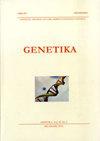Anatomical variability and population structure of Cucumis melo L. accessions collected from Iran
4区 农林科学
Q3 Agricultural and Biological Sciences
引用次数: 0
Abstract
Melon (Cucumis melo) is one of the most important cultivated cucurbits. In this project, the genetic variability among 14 accessions of melon collected by the authors has been studied using 23 anatomical characteristics across 2 consecutive years as well as 146 random amplified polymorphic DNA (RAPD) markers. Combined analysis of variance revealed significant effects on genotype and year ? genotype effects. Among examined anatomical characters, the highest CV% values across two years belonged to fruit store at room temperature (88.96%, 103.6%) and total fruit weight (42.2%, 40.00%), while the lowest CV% values were observed in flower petal width (0.31%, 0.21%), flower petal length (0.28%, 0.49%), and peduncle length (0.40%, 0.19%). Classification of melon accessions based on anatomical characteristics using the Ward method produced three groups. The highest Jaccard?s similarity coefficient (0.76) was observed between accessions ?Atashi koluche? and ?Atashi miyaneh? and the lowest value (0.49) was found between accessions ?Bakermellon? and ?Mashhadi? with the mean value of 0.59. In this study, OPA06 and OPB13 primers possessed greater efficiency in the genetic evaluation of the studied germplasm. Analysis of population structure, which imply on the existence of admixture in the studied melon germplasm, revealing three subpopulations. Accession ?Sabzevari? identified as mixed subgroups. From the breeder?s view, the introduced heterotic groups can be utilized in parental selection for the construction of mapping population and the identified population structure can prevent any false positive output in marker-trait association studies of melon.伊朗甜瓜种质的解剖变异和群体结构
甜瓜(Cucumis melo)是最重要的栽培瓜类之一。本项目利用连续2年收集的14份甜瓜材料的23个解剖特征和146个随机扩增多态性DNA (RAPD)标记,对其遗传变异进行了研究。综合方差分析显示基因型和年份有显著影响。基因型的影响。在各解剖性状中,室温贮藏的CV%最高(88.96%,103.6%),果实总重的CV%最高(42.2%,40.00%),花瓣宽度的CV%最低(0.31%,0.21%),花瓣长度的CV%最低(0.28%,0.49%),花梗长度的CV%最低(0.40%,0.19%)。根据解剖特征,采用Ward方法对甜瓜进行分类,分为三组。最大的雅克?3个品种间的相似系数为0.76。还有?Atashi miyaneh?最小值为0.49。和Mashhadi ?平均值为0.59。在本研究中,op06和OPB13引物对所研究种质的遗传评价效率较高。种群结构分析表明所研究的甜瓜种质中存在杂合,揭示出3个亚种群。加入Sabzevari ?识别为混合子组。从饲养员那里?由此可见,引入的杂种优势群体可用于亲本选择,构建定位群体,所鉴定的群体结构可避免甜瓜标记性状关联研究中的假阳性输出。
本文章由计算机程序翻译,如有差异,请以英文原文为准。
求助全文
约1分钟内获得全文
求助全文
来源期刊

Genetika-Belgrade
AGRONOMY-GENETICS & HEREDITY
CiteScore
1.80
自引率
0.00%
发文量
1
审稿时长
6-12 weeks
期刊介绍:
The GENETIKA is dedicated to genetic studies of all organisms including genetics of microorganisms, plant genetics, animal genetics, human genetics, molecular genetics, genomics, functional genomics, plant and animal breeding, population and evolutionary genetics, mutagenesis and genotoxicology and biotechnology.
 求助内容:
求助内容: 应助结果提醒方式:
应助结果提醒方式:


